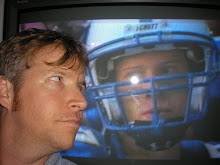The New York Times broke a story this weekend about the corporate backers of Bill O'Reilly and Keith Olbermann brokering an end to their on-air feud.
Although the back-and-forth was good for ratings, the suits decided it wasn't so good for the long-term health of News Corporation or General Electric. According to the Times, Olbermann is standing down on O'Reilly's reactionary spew of half-truths in exchange for an end to O'Reilly's rant about GE's business in Iran. Salon's Glenn Greenwald explains how this agreement fits in nicely alongside other under-reported TV news scandals like the use of "military analysts" paid by the Pentagon.
Punditry masquerading as news is obnoxious, but quelling it via boardroom détente is downright disturbing. Somewhere in the great beyond, Paddy Chayefsky is either giggling or gagging.
UPDATE (11:49pm): Olbermann broke his O'Reilly attack fast this evening, denying that he was ever party to a truce. However, his denial is at odds with the suspect timing of his previously announced moratorium on discussing O'Reilly and the statements made by GE in the Times story.
Subscribe to:
Post Comments (Atom)





2 comments:
I thought the O'Reilly/Olbermann fued actually exhibited some the best attributes of journalism, of a type type that's sadly become more the exception than the rule. Olbermann's claims of O'Reilly's prevarication generated direct responses to them, specious as they were, and O'Reilly's pointing out parent company GE's diddling in Iran and other hostile countries is totally fair game. People can judge the responses for themselves. O'Reilly responds with weak-kneed venom, NBC responds with marching orders from upstairs, and people can judge those outcomes for themselves. That GE and Murdoch decided to bury the hatchet at the executive level says more about their true intentions than it does about these two pundits' journalistic skills.
That’s a point well taken, Patrick. In exhuming important news stories that fell through the cracks, pundits – even when they’re obnoxious – can serve a journalistic function. At least they can so long as they don't upset their corporate parents too much.
Post a Comment